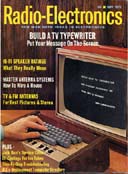 The
term TV Typewriter was made popular by Don Lancaster's video terminal published
in the September 1973 Radio-Electronics magazine. At the time a computer
terminal cost over $1000, this design would allow you to display 16 lines of 32
upper-case characters on a TV set for $120. (Today most personal computers have
the CPU and display circuitry in the same box. In the early 1970s the display
terminal was a separate device.)
The
term TV Typewriter was made popular by Don Lancaster's video terminal published
in the September 1973 Radio-Electronics magazine. At the time a computer
terminal cost over $1000, this design would allow you to display 16 lines of 32
upper-case characters on a TV set for $120. (Today most personal computers have
the CPU and display circuitry in the same box. In the early 1970s the display
terminal was a separate device.)The design sparked a lot interest but it had limitations. You could order the circuit boards from SWTPC but you had to acquire all of the components on your own. At first the kit did not have keyboard but that was added in the April 1974 Popular Electronics magazine. It did not have a serial interface to connect to a modem (Roger Smith published a serial interface in the February 1975 Radio-Electronics.)
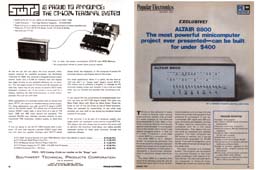 On page 33 of the January 1975 Popular Electronics was the cover story
for the new Altair 8800 computer. On the facing page was an ad for the SWTPC
CT-1024 Terminal System.
On page 33 of the January 1975 Popular Electronics was the cover story
for the new Altair 8800 computer. On the facing page was an ad for the SWTPC
CT-1024 Terminal System.This was a new design by Ed Colle that appeared in a series of
construction
articles in Radio-Electronics starting in February 1975. This also
displayed 16 lines of 32 upper-case characters on a TV as the original TV
Typewriter but it was a more refined design and a came as a complete kit.
Ed Colle tells his story of
the CT-1024 design.
Wayne Green, founder of BYTE magazine, got a CT-1024 to go with his Altair 8800 and had his 12 year old daughter assemble it. Thousands of these kits were sold until it was replaced by an improved CT-64 design in June of 1977.
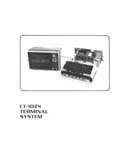 This CT-1024 brochure was written in late 1975. SWTPC generally did
not put dates on the documents but this was an exception. It has
the notation CT-01 Oct. 1975, however later versions of the brochure
that included a newer keyboard (KB-5) also had the Oct. 1975 date.
Getting the date right was not a priority.
This CT-1024 brochure was written in late 1975. SWTPC generally did
not put dates on the documents but this was an exception. It has
the notation CT-01 Oct. 1975, however later versions of the brochure
that included a newer keyboard (KB-5) also had the Oct. 1975 date.
Getting the date right was not a priority.CT-1024 Brochure Text (22K PDF)
Front Cover - Terminal Image (371K JPG)
Back Cover - 6800 Computer (397K JPG)
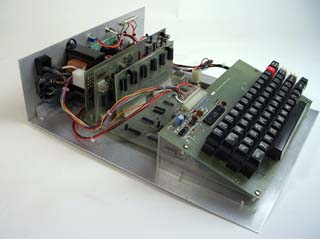
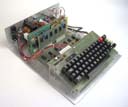
I still have the CT-1024 I built in 1976. I have also restored 3 other CT-1024s back to "original" condition.